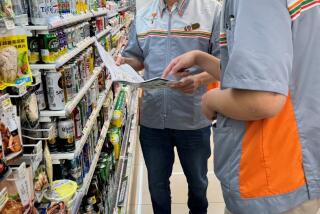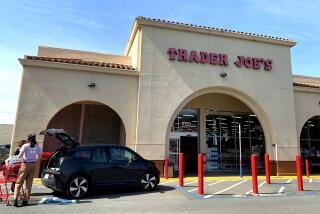Chinese salt hoarders pepper stores with demands for refunds
The panic buying of salt that swept China last week amid fears of radiation from Japan has been replaced with a new frenzy: how to get a refund.
Former hoarders are now lining up at some grocery stores to ask for their money back, especially from shopkeepers who were charging as much as 10 times normal prices for the seasoning, according to Chinese news reports.
“I regret it very much. I will never behave this silly anymore,” a woman who was denied a refund told the West China City News in Nanjing. She reportedly had bought enough salt to last her four years.
Chinese shoppers stripped store grocery shelves bare while the crisis unfolded at Japan’s Fukushima Daiichi nuclear plant. Some were acting on the mistaken belief that iodized salt could protect them from the effects of radiation. Others feared that China’s coastal sea-salt deposits would be contaminated by the crippled plant. Still others said they were hoarding because they saw others snapping up salt.
A television station in southern Yunnan province interviewed a farmer standing next to a 110-pound sack of salt he had bought. It turned out to be inedible, and he couldn’t get a refund.
“I wouldn’t need the [$75] back if I could eat it,” the farmer said.
At a high-end Ole Supermarket in Hangzhou, a line formed for returns Saturday. About 100 bags of salt and a bottle of soy sauce were refunded. Some buyers apparently stocked up on soy sauce after stores ran out of salt.
There was no such luck for shoppers at mega-chains Wal-Mart and Carrefour.
“We can’t refund food products,” said a store employee at a Beijing Wal-Mart on Monday. She gave only her last name, Jin.
National sales of salt peaked Thursday at 370,000 tons as many supermarkets were emptied of the product, the state-owned China Daily reported.
The government then launched a massive crackdown on hoarding, price-gouging and rumor-mongering.
By Saturday, nationwide sales had dropped to 82,000 tons, although that’s still well above the 15,400 tons bought on a typical day.
Police in Hangzhou said they arrested a man who allegedly spread rumors on the Internet about radiation from the Japanese nuclear plant polluting China’s coastal waters. The man was ordered held for 10 days and fined $76, the New China News Agency said.
The salt-buying spree in China comes amid concerns of food contamination in the region.
In Japan, spinach and milk near the crippled nuclear complex were found to have higher-than-normal levels of radiation, as did tap water in Tokyo. In Taiwan, imported fava beans from Japan were found to have small amounts of radiation. Officials said the levels of contamination are not immediately harmful to humans, but the discoveries have raised anxieties.
The last time China faced similar panic buying was during the epidemic of severe acute respiratory syndrome, or SARS, in 2003, when shoppers bought vinegar under the mistaken belief that it could prevent the deadly disease.







